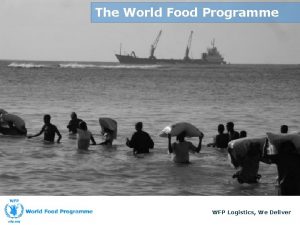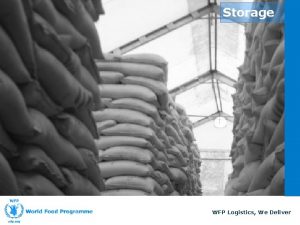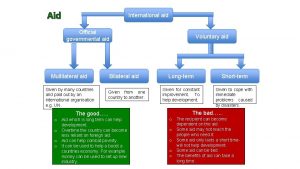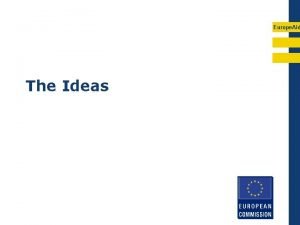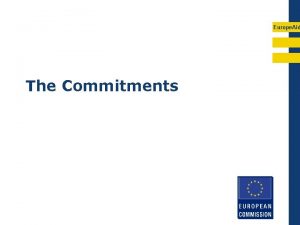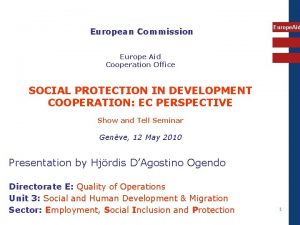Europe Aid How we deliver aid Its not






























- Slides: 30

Europe. Aid How we deliver aid It’s not what you do, it’s the way you do it

Aid approaches Projects are proliferating Europe. Aid

Aid approaches Project sizes are falling Europe. Aid

Aid approaches in the EU Europe. Aid

Financing modalities in the EC Europe. Aid

Overview • Aid approaches o o o The project approach (Technical Cooperation) Programme-based approaches • Financing modalities o o Specific procedures Pool funding Budget support Delegated cooperation Europe. Aid

The project approach Europe. Aid

The project approach Europe. Aid A project is a series of activities aimed at bringing about clearly specified objectives within a defined time period and with a defined budget. A project should have: • Clearly defined stakeholders • Clearly defined coordination, management and financing arrangements • A monitoring and evaluation system to support performance management • An appropriate level of financial and economic analysis, which indicates that the project’s benefits will exceed its costs

The project approach Europe. Aid Advantages Disadvantages • Help people fast: when they need it & the gvmt can’t / won’t • Versatile: customise, adapt, learn • Tangible: down-to-earth, practical, visible • Not endorsing the gvmt but still helping the people • Civil society: NGOs, independence, capacity • Ownership & accountability: gvmt & beneficiaries • Fragmentation: gaps & overlaps unless heavy coordination • Transaction costs: lots of admin for donors, headaches for gvmts • No policy dialogue • Undermines state: parallel infrastructure rather than CB • Unsustainable: usually • Big problems=Big solutions: donors=macro, NGOs=micro

The project approach Europe. Aid When is a project appropriate? Decentralised cooperation with non-public entities Emergency aid and post-crisis interventions Technical assistance projects Pilot projects Regional environmental projects or international public goods Investment projects with high transaction costs for governments • When conditions within a country or a sector do not yet allow other approaches to be used • • •

Technical cooperation EC reform Europe. Aid Objectives of reform • Provide good quality TC that supports countryled programmes based on strong partner demand • Provide support through partner-owned project implementation arrangements with substantial reduction of parallel PIUs

Technical cooperation Europe. Aid EC quality assessment 5. The programme implementation arrangements are appropriate 4. Link to outputs and expected outcomes 1. Demand, adequate ownership and capacity of partners Quality EC Technical Cooperation 2. Fits the context and existing capacity 3. The support is harmonised and sustainability of benefits considered

Programme-based approaches: objectives Europe. Aid • Broaden ownership by partner countries of decision making on policy, strategy and spending • Increase coherence between policy, spending and actual results • Use / support government systems, harmonise donor systems (reduce transaction costs)

Programme-based approaches: key elements • Leadership and ownership by the host country • Formalised process for donor coordination and harmonisation of procedures • Efforts to increase the use of local systems • Single comprehensive programme and budget framework Europe. Aid

Programme-based approaches: two levels Macro Sector Regular policy dialogue National level Sectoral level Operational framework National Development Strategy or PRSP The Sector Programme prepared by the government Financing modality General budget support Specific procedures Pool funding Sector budget support Europe. Aid

Programme-based approaches: definition of the SWAP Europe. Aid • All Together: one sector, one strategy, one budget, one set of results, one performance measurement system • Government leads on the policy, budget, etc. & Donors and others support • Different financing modalities: projects, pool/basket funds, technical assistance, budget support… but all joined up • PBA à la Paris: o Governement-led o Single framework o Donor coordination o National systems

Programme-based approaches: pros & cons of the SWAP Europe. Aid Advantages Disadvantages • Ownership: government sets sector policy priorities • Transaction costs: one goal, framework, measurement systems & donors coordinate • Alignment & harmonisation: all together, gvmt systems • MFR & MA: one set of results & measurement framework • Ownership: donors erode gvmt independence & time to influence policy • Coordination costs: taking account of others isn’t always easy • Financing: specific procedures – high transaction costs, pool funding - high coordination costs • Not budget support: you agree with the strategy, etc, so why not?

Aid approaches & Financing modalities Europe. Aid approaches Specific procedures* Projects Common fund Sector Budget support Macro * Specific procedures: Tendering and Grant Award procedures of the European Commission

Financing a sector programme Europe. Aid

Financing a sector programme Donor X Donor Y Donor Z Sector budget support Donor X Other national revenues ‘Pool Fund’ Treasury Co-financed activities Sector Programme Projects Europe. Aid

Budget support Europe. Aid

Budget support Europe. Aid Budget support is the transfer of financial resources of an external financing agency to the National Treasury of a partner country, following the respect by the latter of agreed conditions for payment. The financial resources thus received are part of the global resources of the partner country, and consequently used in accordance with the public financial management system of the partner country.

Budget support • General vs. Sector • Short-term vs. Medium-term support • General vs. Specific conditions • Untargeted vs. Targeted • Fixed vs. Variable tranches • Floating vs. Non-floating tranches • MDG contract Europe. Aid

Budget support Europe. Aid Advantages Disadvantages • Paris in a can: ownership, • Neo-colonialism? Conditions for alignment, harmonisation, MFR, cash, policy straightjacket, social MA contract • Reinforces the state: capacity, • It’s all our fault? Accomplice to legitimacy, accountability • Less transaction costs: national strategy, indicators, reporting & one instrument • We do something BIG: everything… legally safe but taxpayer, press • Predictability: vague / political conditions + sensitive triggers + heavy admin = aid shocks. national policy, national impacts • Transaction costs: different • Less hassle: easy spending, no projects, gvmt responsibility • Walking the talk: all our AE commitments include it donors, conditions, indicators, reporting & monitoring the consultants • Visibility: the folks back home

Budget support • • • Europe. Aid Early studies (1970 s-1990 s): Aid has little impact at a macro level. Burnside & Dollar (2000): Aid does have positive effect on growth, but only in in the presence of sound policies. Hansen & Tarp (2001): Aid works irrespective of the policy environment. Bourgignon et al (2008): There is very little correlation between per capita income growth and MDG performance. Beynon & Dusu (2010): Countries receiving large amounts of budget support perform better than those receiving little or no budget support.

Budget support The future of EU budget support to third countries COM(2010) 586 final Europe. Aid The future approach to EU budget support to third countries COM(2011) 638 final

Budget support Europe. Aid A vector for change: • Promoting human rights and democratic values • Improving financial management, macroeconomic stability, inclusive growth and the fight against corruption and fraud • Promoting sector reforms and improving sector service delivery • State-building in fragile states and addressing development challenges of SIDs and OCTs

Budget support 3 instruments: • Good Governance and Development Contracts to replace GBS and be provided when there is trust and confidence that aid will be spent pursuing the fundamental values of human rights, democracy and rule of law • Sector Reform Contracts to provide SBS in order to address sector reforms and improve service delivery • State Building Contracts to provide budget support in fragile situations Europe. Aid

Delegated cooperation Europe. Aid The European Commission can delegate authority to manage funds to another donor and can also be delegated authority by another donor. Entity Management mode Legal instruments Procedures International organisation Joint Standard contribution agreement International organisation Public/private body with a public service mission Indirect centralised Delegation agreement EC or delegated body Beneficiary country Decentralised Financing agreement Beneficiary country, EC or other donor European Commission N/A Transfer agreement EC

Delegated cooperation Europe. Aid Advantages Disadvantages • Specialisation: more of what • Donors are different: priorities, everyone is good at doing ways of working, sensitivities • Coordination: less gaps & • Ready to work differently? overlaps, more trust • Economies of scale: bigger programmes, lower overheads cooperation, coordination, compromise & risk-taking • Ready to shut up? risk • Transaction costs: less actors management = reporting • Better decision making: requirements & meddling = everyone knows who is doing what • Accountability: track progress against promises • EU image: implementation of the EU consensus on dev transaction costs • Strategic sectors • Logic of EC-MS delegation? they pay us, we pay them, they pay us again, we pay them again, … efficient?
 Its not easy but its worth it
Its not easy but its worth it Sadlier vocabulary workshop level d unit 1 synonyms
Sadlier vocabulary workshop level d unit 1 synonyms How did its rivers affect eastern europe
How did its rivers affect eastern europe Wfp logistics
Wfp logistics We deliver the world
We deliver the world Call 2. ve 3. hali
Call 2. ve 3. hali A truck driver attempting to deliver some furniture
A truck driver attempting to deliver some furniture To entertain speech
To entertain speech Cheapest to deliver bond
Cheapest to deliver bond Destructive event or prank a virus was created to deliver
Destructive event or prank a virus was created to deliver Nollaig shona meaning
Nollaig shona meaning Create capture deliver value
Create capture deliver value Together we deliver
Together we deliver Discover define develop deliver
Discover define develop deliver How will you bill and deliver the guest laundry
How will you bill and deliver the guest laundry Dream design deliver
Dream design deliver Does ups deliver on saturday
Does ups deliver on saturday From the fury of the northmen deliver us
From the fury of the northmen deliver us Naked short seller
Naked short seller A catalog sales company promises to deliver
A catalog sales company promises to deliver A truck driver is attempting to deliver some furniture
A truck driver is attempting to deliver some furniture First aid merit badge first aid kit
First aid merit badge first aid kit Neasden and greenhill medical centre
Neasden and greenhill medical centre Evaluate the trig function using its period as an aid
Evaluate the trig function using its period as an aid Sec unit circle
Sec unit circle Emigree poem analysis
Emigree poem analysis When a train increases its velocity its momentum
When a train increases its velocity its momentum Sunny rainy windy snowy
Sunny rainy windy snowy If its square its a sonnet summary
If its square its a sonnet summary Its halloween its halloween the moon is full and bright
Its halloween its halloween the moon is full and bright Trade not aid
Trade not aid



